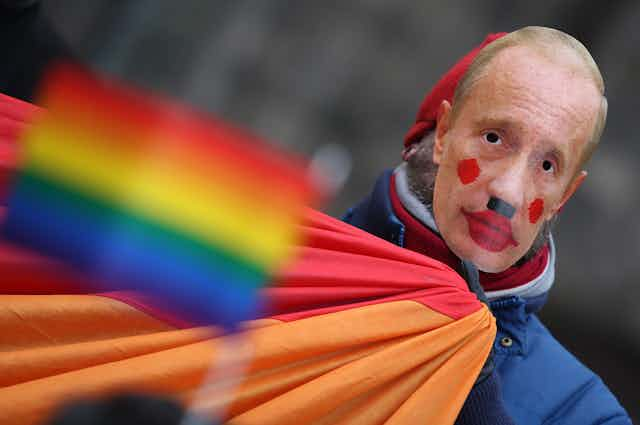This week, the largest, coolest and most promising Australian Winter Olympics team to ever leave these shores landed in Sochi. But there’s more than gold on their minds – they want their presence to mean something.
With the endearing nonchalance so typical of the extreme sports star, snowboarder Belle Brockhoff told reporters that she’d considered whether or not to address the issue of lesbian, gay, bisexual, and transgender (LGBT) rights during the games and concluded that, “screw it”, she would.
Her stand isn’t surprising; she stated this intention back in December, and her Twitter account carries a “No to H8” logo.
Belle’s got some powerful friends. Today, Google celebrates the opening of the games with a rainbow flag logo and a reminder of the Olympic Charter:

The practice of sport is a human right. Every individual must have the possibility of practising sport, without discrimination of any kind and in the Olympic spirit, which requires mutual understanding with a spirit of friendship, solidarity and fair play.
Before a ski boot is buckled, it’s clear that Sochi will be a media event that will not let Russia disguise its disdain for LGBT rights.
The idea of the Olympics as a political spectacle that gives individual athletes the power to make a difference to global human rights is hardly novel. But what is new is the people who produce the Olympics as a media event are accepting and embracing this as part of the drama that audiences need and want.
It’s written in the history books
The 2012 London Olympics kicked off with politics, and everyone loved it.
Danny Boyle’s dizzying blend of the industrial revolution, James Bond, the Arctic Monkeys and a tribute to National Health Service was dismissed as “multicultural crap” by Tory MP Aidan Burley.
London mayor Boris Johnson was far more welcoming, lauding Boyle for saying something meaningful, in an entertaining way. If anyone knows that politics can be entertaining, and that being entertaining is a great way to make a political point, it’s surely the Mayor of London.

Google’s decision to label Sochi as a human rights affair brands the Olympics as a politicised media occasion, above and beyond anything else – whatever the IOC might think.
This isn’t surprising, given the company’s recent history. Back in 2012, when UN Secretary General Ban Ki-Moon wanted to show his desire to connect with young people from around the world on human rights issues, he chose Google+ Hangout to do it. Social media seemed the natural heir to article 19 of the UN’s Declaration of Human Rights:
Everyone has the right to freedom of opinion and expression; this right includes freedom to hold opinions without interference and to seek, receive and impart information and ideas through any media and regardless of frontiers.

So, if Brockhoff demonstrates her solidarity with the Russian LGBT community, she won’t suffer Peter Norman’s fate. Everyone’s stopped pretending that politics isn’t part of the show.
On the other hand, it’s worth asking how the stage has been set, such that the snowboarder’s undoubted mettle is likely to become a historical fact?
It’s also a fact that Google has played an active part in integrating young, grass roots activists with powerful political and media interests.
Company executive Jared Cohen co-founded Movements.org, an organisation where Google have joined with Facebook, MTV, Pepsi and CBS news – among others – to help young activists use social media to battle oppression, wherever they may be.
The organisation emerged from the Alliance of Youth Movements; a collective characterised by critics as an agent of US soft power; that is, Google’s interest in human rights has been criticised as less disinterested than it might appear.
And, of course, the Olympic Games is a commercial media event that can only communicate the messages that sponsors will pay for. In London, the world saw how business concerns compromised Twitter’s commitment to freedom of speech.
Let’s celebrate Belle Brockhoff, without reservation. But let’s also think about the global media conditions that give her a voice. Because ultimately, they decide what we hear.

